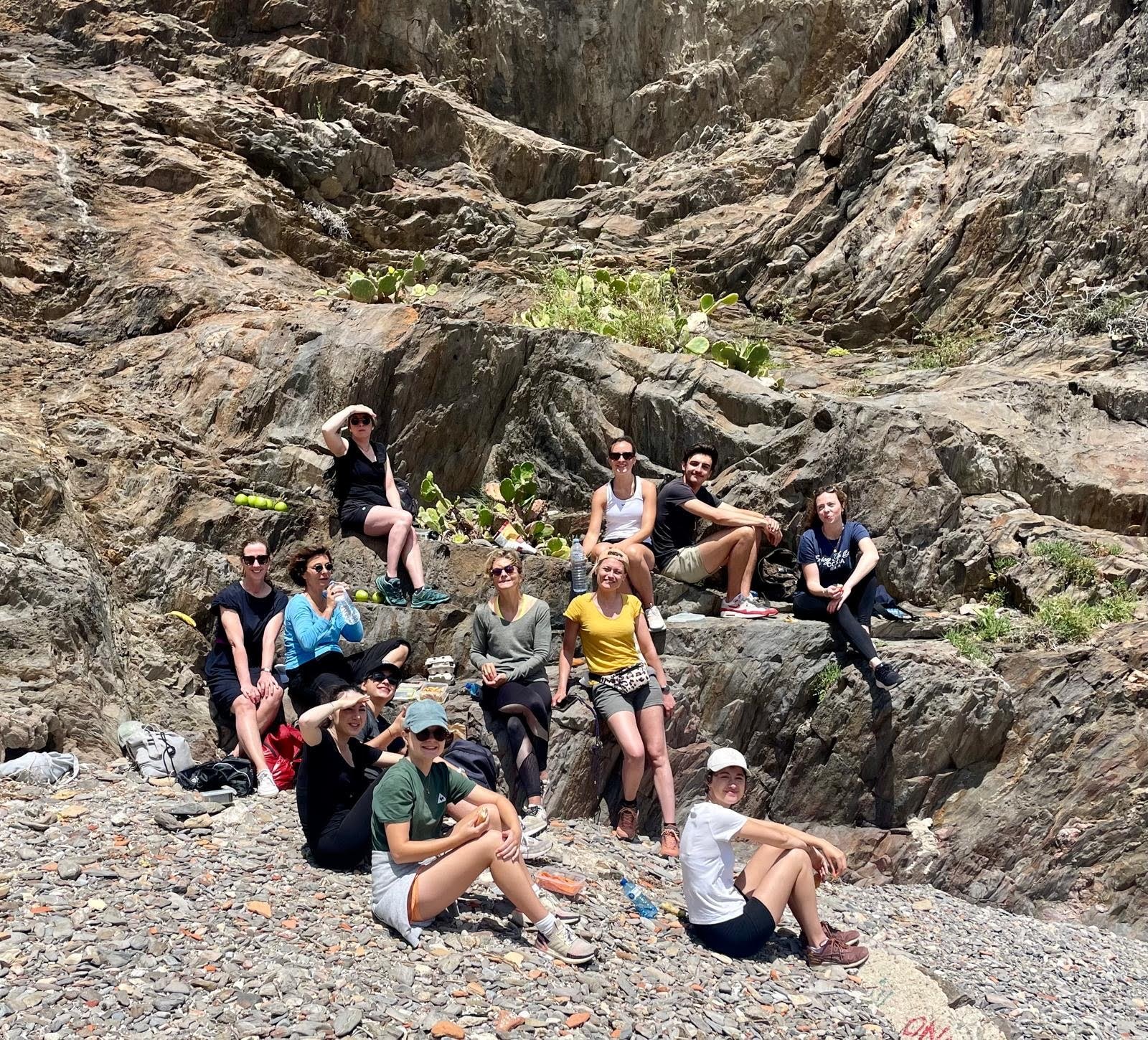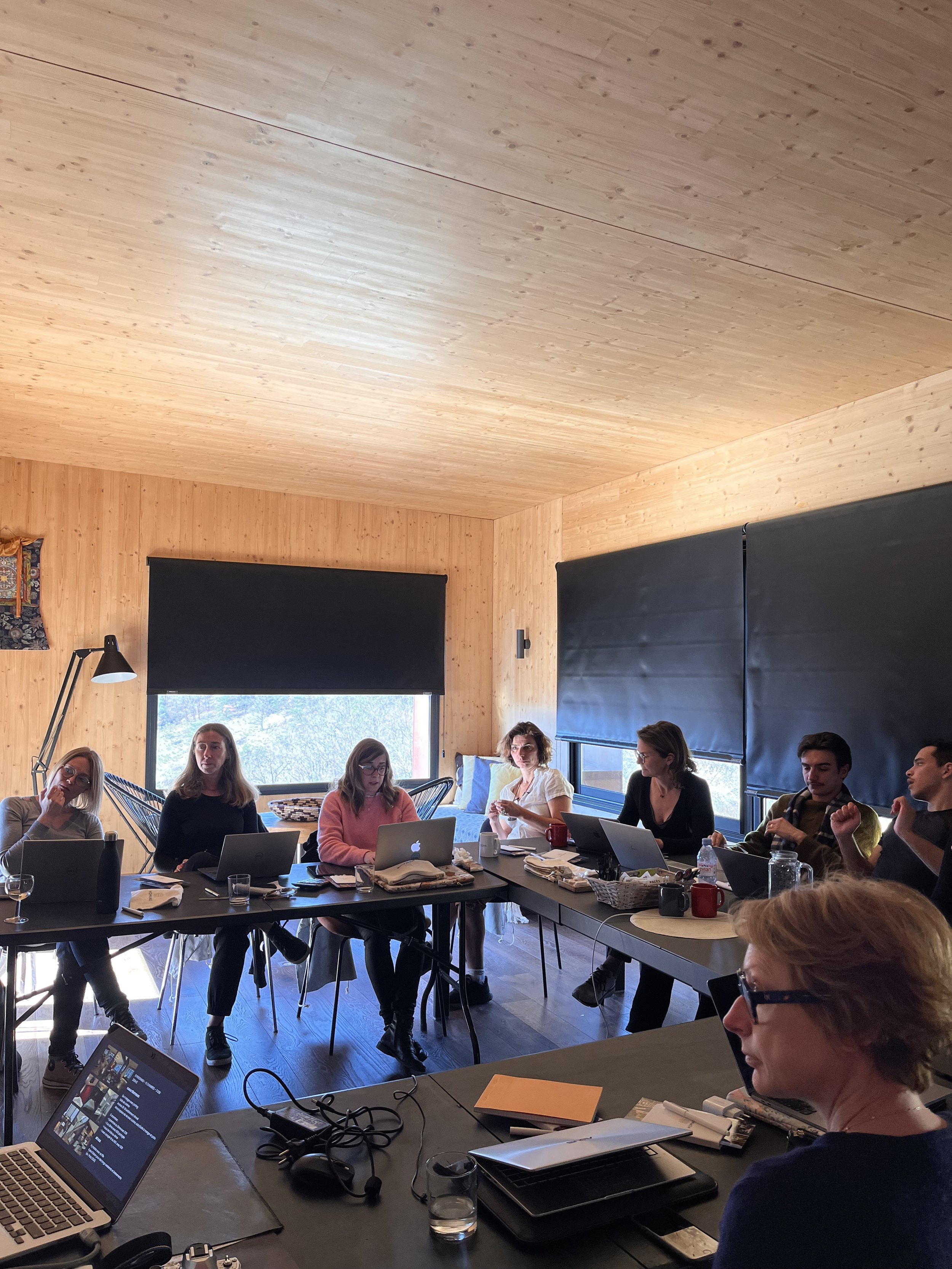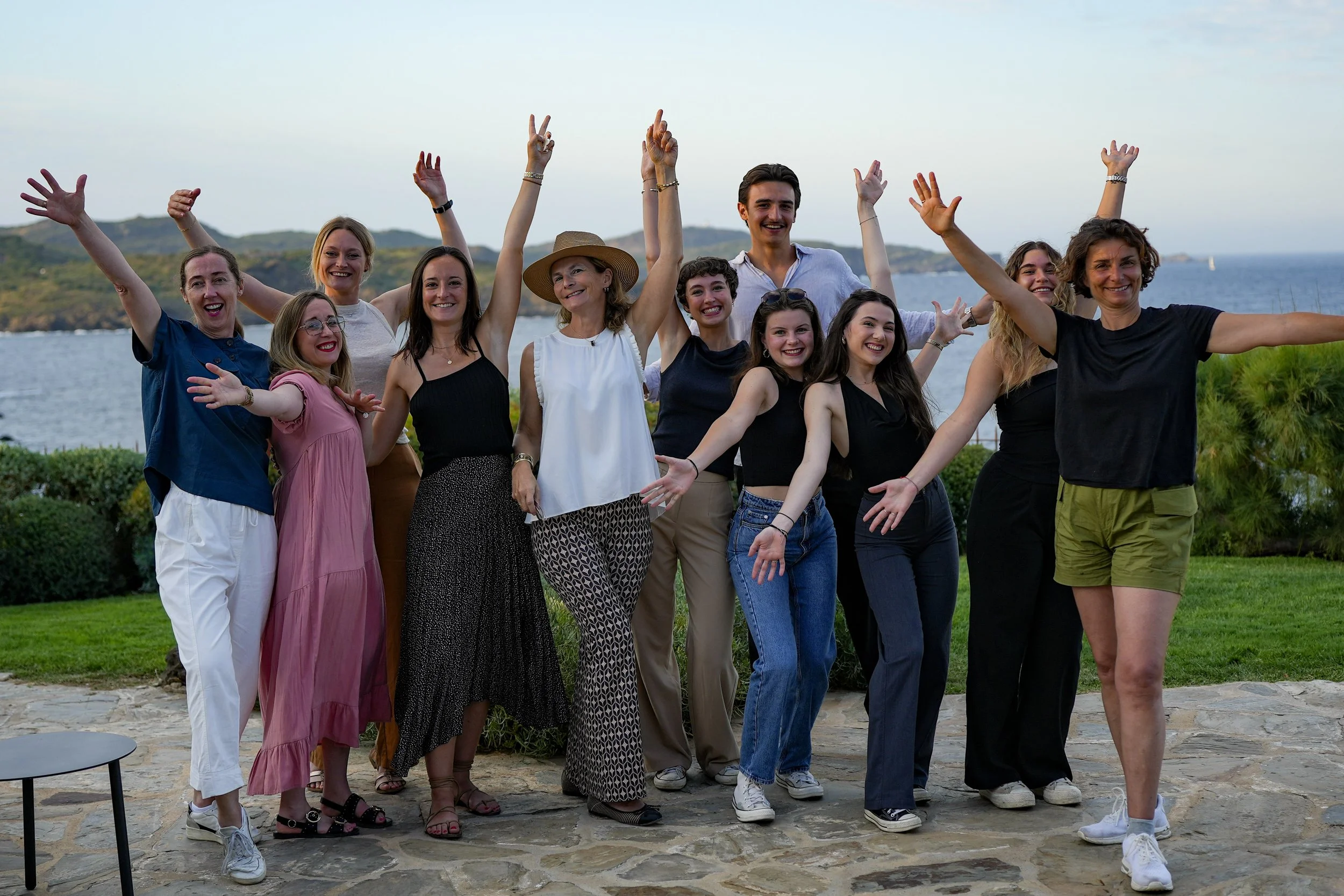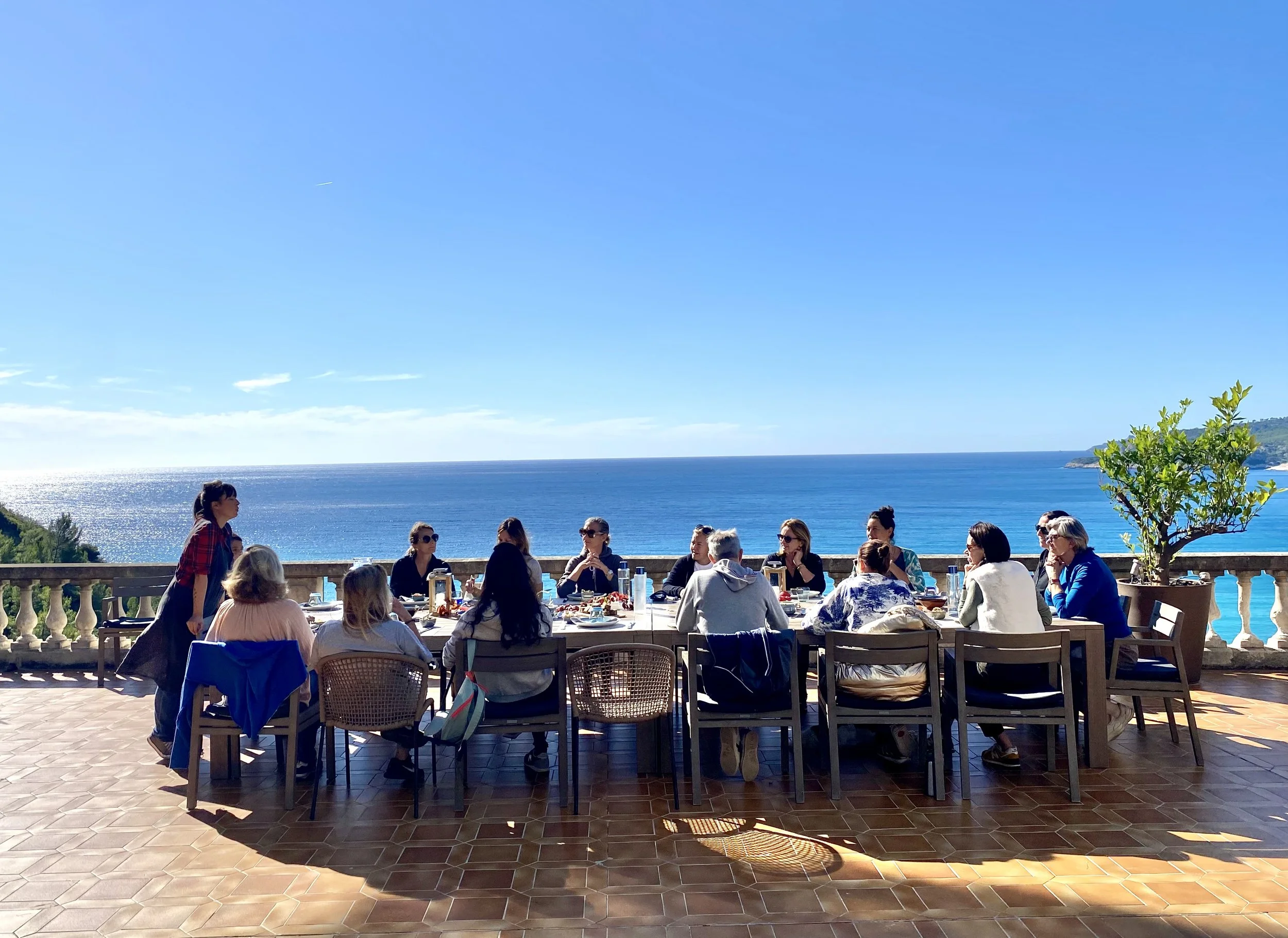Offsite Event: How to Plan a Successful company offsite
Published on July 28, 2025 | Reading time: 7 min
By Laurine Baille, Marketing at HOMANIE
In today's fast-paced corporate world, offsite events have become a crucial strategy for enhancing team cohesion, boosting morale, and driving innovation. Whether you're a seasoned event planner or a first-timer, this comprehensive guide will walk you through the essentials of creating a memorable and effective offsite experience tailored for International corporate culture.
Summary
What is a company offsite?
A company offsite is a meeting held away from the regular office, designed as a strategic gathering that brings team members together in a new and inspiring environment. These offsite events are specifically created to support strategic planning, foster team building, and encourage professional development. By stepping outside the usual workplace, teams are able to disconnect from day-to-day routines, strengthen collaboration, and build stronger interpersonal connections. Offsites can last from a single day to several days and may take place in a wide range of locations, from nearby venues to more remote or international destinations.
“Choosing a location for an offsite event is a strategic decision: it should reflect your high standards, but above all, your intention to create a meaningful, structured, and authentic experience.”
- Clémence Enaud, Corporate Event Expert
What happens at a company offsite?
Strategic planning sessions
During an offsite event, you can organize meetings focused on defining the next steps in the company’s strategy. These sessions provide the perfect opportunity for everyone to understand the shared objectives and adjust their personal goals accordingly. It ensures the entire team remains aligned, working in the same direction, while also bringing in new ideas and perspectives.
Team bonding moments
It’s crucial to plan moments of team bonding. These informal moments, away from the daily office stress, are ideal for fostering collaboration and building strong relationships. Whether it’s sharing a meal, playing games, or just having a coffee together, these moments allow team members to get to know each other better and strengthen cooperation. They’re essential for improving the overall atmosphere and team spirit.
Personal development workshops
Personal development is key to a high-performing team. A confident and fulfilled individual is more likely to be motivated and productive. During the offsite, you can offer practical workshops that help colleagues develop personal skills, such as communication, stress management, or decision-making. These sessions allow everyone to feel valued and improve their well-being at work.
Social activities
Understanding and connecting with colleagues outside the professional context is essential for building strong relationships. Social activities, whether it’s group outings, evening events, or team-building games, are simple yet effective ways to foster mutual understanding. They allow team members to see each other in a different light, strengthening trust and camaraderie within the group.
Why are offsites important?
Stronger Human Connection
The time spent away from work provides a unique opportunity to build stronger human connections. Away from the formal office setting, the relaxed atmosphere allows for more sincere and authentic conversations. It’s a chance to get to know colleagues better, understand their values, personalities, and strengthen the trust within the team.
Higher engagement & motivation
Organizing an offsite also creates an environment that fosters team cohesion. By sharing these moments together, team members feel more connected to the company and its goals. A happy employee is an engaged employee, and these moments not only boost motivation but also enhance the sense of belonging to a united group.
More creativity & better ideas
A change of scenery often has the power to free the mind. In an informal setting, ideas flow more freely, and creativity is fully expressed. Away from the usual constraints, each team member can share their ideas without hesitation, often leading to innovative solutions and fresh perspectives that wouldn’t have been considered in the office.
Improved focus & productivity
Stepping away from the daily routine allows everyone to refocus on priorities and approach projects from a fresh angle. Being in an inspiring environment helps everyone concentrate fully on the goals at hand. Plus, these moments of pause and reflection provide clarity of mind, boosting productivity in the long term once back at the office.
Types of Offsite Events
Team-Building Offsites
Team-building offsites are designed to strengthen interpersonal relationships through shared experiences in a relaxed, inspiring environment. Collaborative activities like cooking classes, ropes courses, or collaborative problem-solving challenges are common, but the setting can significantly amplify their impact.
Hosting these experiences in a private villa or exceptional property allows teams to disconnect from daily routines and truly engage with one another. Picture a team cooking class led by a private chef in a Provençal estate kitchen, or a strategy game unfolding in the gardens of a secluded countryside manor. Whether nestled in the hills of Provence, overlooking the Mediterranean, or surrounded by vineyards, these exclusive locations provide the perfect backdrop for connection, creativity, and growth for your corporate retreat.
More than just a change of scenery, these properties offer privacy, comfort and flexibility, all essential ingredients for a meaningful and productive team-building retreat.
Leadership Retreats and Executive Offsites
Tailored for senior leadership teams, executive offsites are designed to foster deep strategic thinking, innovation and alignment at the highest level. These gatherings go beyond routine meetings, they provide the time and space needed to step back, assess long-term goals and make high-impact decisions.
In these peaceful environments, leaders can disconnect from daily operational pressures and immerse themselves in strategy, vision-building and team cohesion. Dedicated spaces for workshops, breakout sessions, and private discussions paired with luxury amenities and attentive service, ensure that both comfort and productivity are maximized.
Ultimately, a well-chosen retreat venue allows executive teams not only to align on business priorities but also to reconnect as individuals, and strengthening relationships that are critical to effective leadership.
Company-Wide Offsite Events
Company-wide offsite events are large-scale gatherings that bring together employees from across departments, offices or even countries. They are powerful moments for reinforcing company culture, celebrating milestones and aligning teams around future goals. These events often combine keynote presentations, interactive workshops, team sessions and festive activities to create a sense of unity and shared purpose.
Hybrid or Flexible Offsites
As remote and hybrid work models become standard in many organizations, hybrid offsite formats have emerged as a smart, inclusive solution. These events blend in-person gatherings with virtual participation, allowing distributed teams to reconnect, collaborate and align regardless of their location.
While virtual tools make it possible to stay connected day to day, nothing replaces the impact of meeting face-to-face. That’s why many companies are choosing to anchor their hybrid offsites in inspiring, well-equipped physical venues, such as private villas or estates. These locations offer a relaxed yet professional environment that fosters engagement, creativity, and a genuine sense of connection, even if not every team member is physically present.
With spacious interiors, high-speed internet, breakout rooms, and outdoor areas ideal for informal discussions, such properties are naturally suited to hybrid formats. Team members joining remotely can feel more involved when the physical side of the offsite is set in a vibrant, carefully curated space far removed from sterile corporate settings.
Offsite vs onsite: What’s the difference?
Purpose, Logistics and Venue Choices
The key distinction between onsite and offsite events lies in both location and intention. Onsite events typically take place within the office or in nearby venues, such as conference rooms, coworking spaces, or local hotels with a focus on convenience, time efficiency and budget-friendly planning. While practical, these gatherings often maintain the same dynamics as everyday work, limiting opportunities for deeper connection or fresh thinking.
Offsite events, in contrast, are purposefully designed to create a shift in mindset by physically removing teams from their routine environment. The change of scenery helps participants disengage from daily responsibilities and distractions, making space for more focused collaboration, creativity, and bonding. Offsites are most effective when held in scenic, inspiring venues: places that feel special and invite people to think differently.
Pros and Cons of Each Format
Both onsite and offsite events have their merits, and the right choice depends on your goals, team size and available resources.
Onsite events are typically easier to coordinate. They require less logistical planning, involve minimal travel and are more cost-effective making them ideal for quick meetings, training sessions or day-long workshops. Because they take place in familiar settings, they can also feel more grounded and less disruptive to everyday workflows.
Offsite events, on the other hand, require more preparation and a higher upfront investment, from selecting a location to managing accommodations and transportation. But the returns are significant. By relocating your team to a new, inspiring environment, you create the space for renewed focus, stronger engagement and more authentic human connections.
What Are Offsite Activities?
The success of an offsite often hinges on the activities chosen. These should align with your objectives, whether you're aiming to energize, educate, or inspire. Find all our corporate retreat ideas:
Team-Building Workshop Examples
Well-designed workshops are at the heart of any impactful offsite. From escape games that test logic and cooperation, to cooking competitions that encourage creativity and teamwork, these experiences go beyond fun, they build essential soft skills. Hackathons, innovation sprints or business simulations allow teams to tackle real challenges under time pressure, fostering collaboration, problem-solving and leadership.
Wellness and Creative Activities
Balancing intensity with rest is key to any well-rounded offsite. Wellness activities such as yoga, meditation or guided forest walks help participants decompress and refocus. These moments of calm not only reduce stress but also improve overall engagement and mental clarity during the more demanding parts of the retreat.
Incorporating creative experiences like painting workshops, photography walks or floral design classes unlocks imagination and brings people together in new ways. When practiced in inspiring surroundings, such as a villa overlooking rolling hills or a garden scented with lavender, these activities feel organic and rejuvenating. This balance of mind and body creates a more holistic and human-centered team experience.
Content-Generation Exercises
For communication, branding, or product teams, offsites also offer the chance to produce meaningful content while building team synergy. Storytelling workshops, brand positioning exercises or content creation sprints can generate real value from blog posts and campaign ideas to videos and photos captured on-site.
How to Plan an Effective Offsite Event
Planning an offsite that delivers real value involves more than just booking a venue. Here are the key steps:
Set Clear Objectives and Goals
Start by identifying why you're organizing the event. Are you aiming to build trust? Define a new strategy? Celebrate achievements? Having clarity from the start helps shape the entire experience.
Define Budget and Timeline
A realistic budget and a clear timeline are essential. Allocate funds for accommodation, meals if you want a private chef or not,activities, transportation and unexpected costs. The earlier you plan, the better your options will be.
Plan for inclusivity
When planning an offsite, inclusivity should be a central consideration to ensure that everyone feels welcome and valued. This includes choosing accessible venues for people with disabilities, offering diverse food options, and ensuring that activities cater to a wide range of abilities and interests.
Invite the Right Attendees
Not every offsite needs to involve the entire company. Choose participants based on the event’s purpose whether it’s a leadership retreat, department workshop, or company-wide gathering.
Choose the Right Venue
Choosing the right venue is one of the most crucial decisions when planning an offsite event, it sets the tone, shapes the atmosphere and often determines how memorable and effective the experience will be.
A well-chosen venue goes beyond simple logistics. It becomes an active part of the experience. A peaceful countryside estate might encourage deep reflection and intimate collaboration, while a seaside villa can energize teams with light, air and a feeling of escape. A mountain retreat, on the other hand, offers serenity and focus, ideal for strategic sessions or executive alignment. Tips for Seamless Offsite Logistics
Transportation and Accommodations
Ensure all guests can arrive easily and rest comfortably. Provide group transportation options when necessary and make sure the accommodations are both functional and inviting.
AV, Catering and Contingency Planning
Behind every seamless offsite lies meticulous planning, and nothing can derail a great experience faster than technical hiccups or overlooked details.
Audio/visual (AV) equipment: ensure your venue is equipped with high-quality projectors, microphones, screens and speakers, especially if your agenda includes presentations, keynote speeches or hybrid participation via video conferencing. Strong and stable Wi-Fi connectivity throughout the property is essential particularly for remote attendees or collaborative tools that rely on real-time input.
Catering should go beyond just feeding the team, it should contribute to the experience. Look for options that reflect the local culture or elevate mealtimes with seasonal, gourmet ingredients.
Contingency plan: if your event includes outdoor activities or dining under the stars, have an indoor alternative ready in case of poor weather. Anticipate travel delays, cancellations, or last-minute changes in the number of attendees by confirming flexible policies with suppliers and venues.
Involve your team
Involving your team in the planning process not only boosts engagement but also ensures that the event aligns with their needs and expectations. Get feedback on venue options, activity preferences, and even meal choices. This collaborative approach will make your event more enjoyable for everyone and help build a stronger, more connected team.
Sample company offsite agenda
1 day offsite agenda
9:00 AM - Arrival & welcome breakfast
10:00 AM - Strategic planning session.
12:00 PM - Personal development workshop
1:00 PM - Lunch
2:00 PM - Team building activity: Tree climbing adventure
4:00 PM - Closing remarks
2 day retreat schedule
Day 1
9:00 AM - Arrival & welcome breakfast
10:00 AM - Reflection & action plan
11:00 AM - Collaborative session
12:30 PM - Lunch
2:00 PM - Personal development workshop: cooking class
4:00 PM - Free time and networking
7:00 PM - Dinner & gala night
Day 2
10:00 AM - Strategic planning session
11:00 AM - Creative workshop: Idea generation
12:00 AM - Lunch
2:00 PM - Final team activity: Outdoor challenge
4:00 PM - Closing remarks
Best offsite venues
What makes a great offsite venue?
An exceptional venue for an offsite must offer optimal comfort for the entire team, with elegant meeting spaces and refined relaxation areas. The location is crucial: prestigious regions like the south of France, the Alps, or the countryside near Paris create a serene environment conducive to reflection, creativity, and disconnection. The property must combine functionality and luxury: modular meeting rooms, outdoor spaces for exclusive team-building activities, and high-end gastronomic options. Tailored experiences, such as cooking classes with a Michelin-starred chef or private tastings, add a unique touch to the event.
Example prenium offsite venues
HOMANIE takes care of everything to make your corporate retreat in France an exceptional experience. Whether you’re looking for a corporate retreat in Provence, a corporate retreat near Paris, a corporate retreat in the South of France, or even a French Alps seminar, we offer outstanding properties perfectly tailored to your needs. Enjoy a unique setting, premium services and flawless organization to ensure your professional event’s success with complete peace of mind.
FAQ – Your Offsite Event: Frequently Asked Questions
-
An offsite event is a corporate meeting or team gathering held outside the usual workplace. These events take place in inspiring and often scenic venues such as luxury villas, countryside estates, or exclusive properties, to encourage creativity, collaboration, and fresh perspectives. Offsite events help teams disconnect from daily distractions and foster stronger interpersonal connections.
-
Organizing an offsite event boosts team engagement, motivation, and innovation by breaking away from the standard office environment. Offsite settings promote strategic thinking, improve communication, and strengthen company culture. Whether it’s a leadership retreat, team-building session, or company-wide gathering, offsite events offer an ideal environment for meaningful interaction and goal alignment.
-
Offsite activities are specially designed experiences that promote teamwork, wellness, and creativity. Examples include team-building workshops like cooking classes and escape rooms, wellness sessions such as yoga or guided nature walks, and creative exercises like brainstorming or content generation. These activities are tailored to enhance collaboration and make the offsite event productive and memorable.
-
The primary difference between offsite and onsite events is the location and purpose. Onsite events occur within or near the workplace, offering convenience and cost savings. Offsite events, however, take place in distinct venues away from the office, such as luxury villas or natural retreats, to inspire innovation and deeper connections. Offsites create a change of environment that often leads to higher energy, creativity, and team cohesion.
-
Two days is ideal for truly benefiting from an offsite experience. This duration allows participants to fully immerse themselves, fostering meaningful exchanges, team bonding, and reflection. A well-paced offsite gives enough time for both structured activities and relaxation, ensuring everyone can connect on a deeper level and come away with fresh insights and stronger relationships.
-
Homanie can assist you in organizing a tailor-made offsite experience: from booking the venue and arranging activities to securing top chefs. With expert knowledge of the selected region, we ensure every detail is carefully curated to meet your specific needs, making the offsite an unforgettable and seamless experience.
























